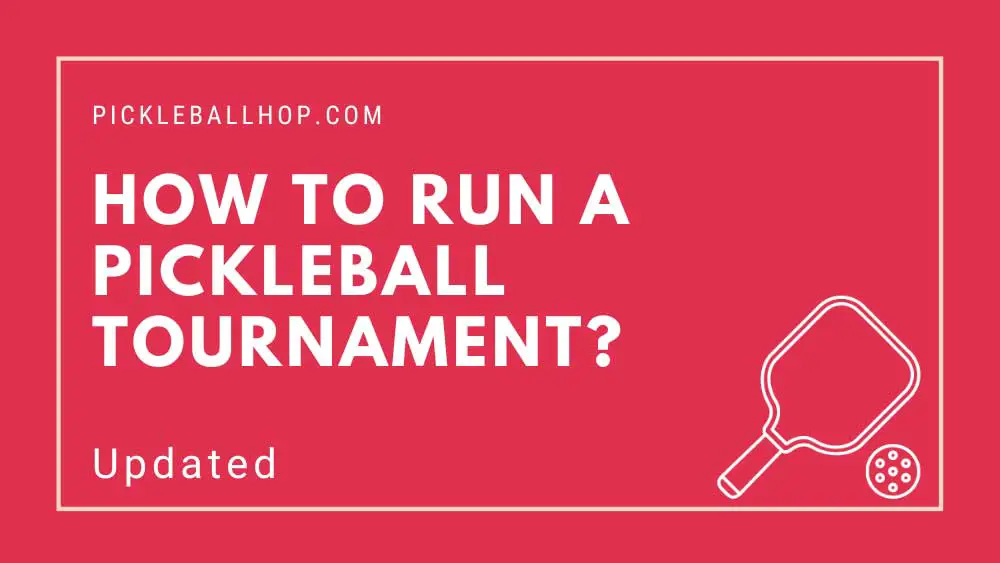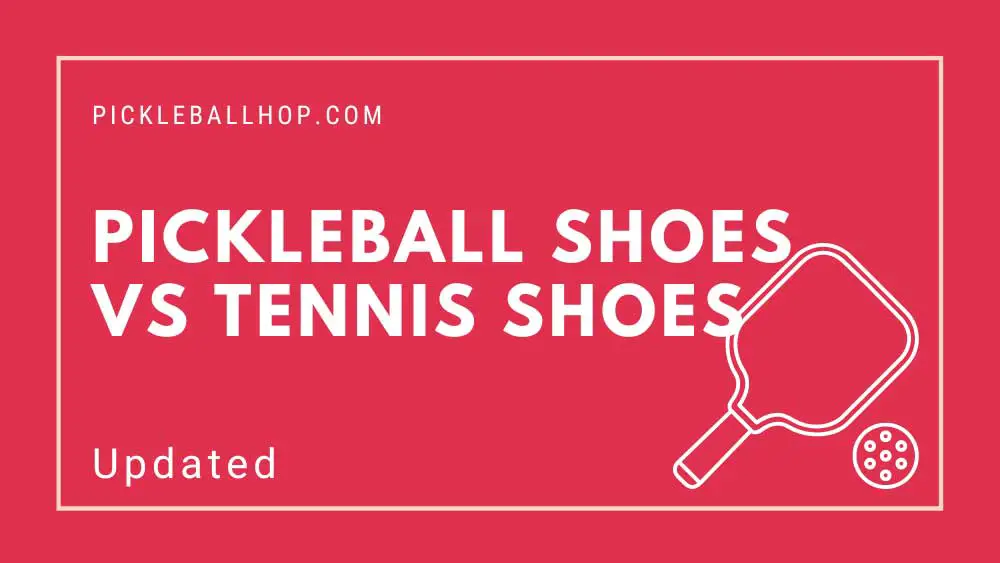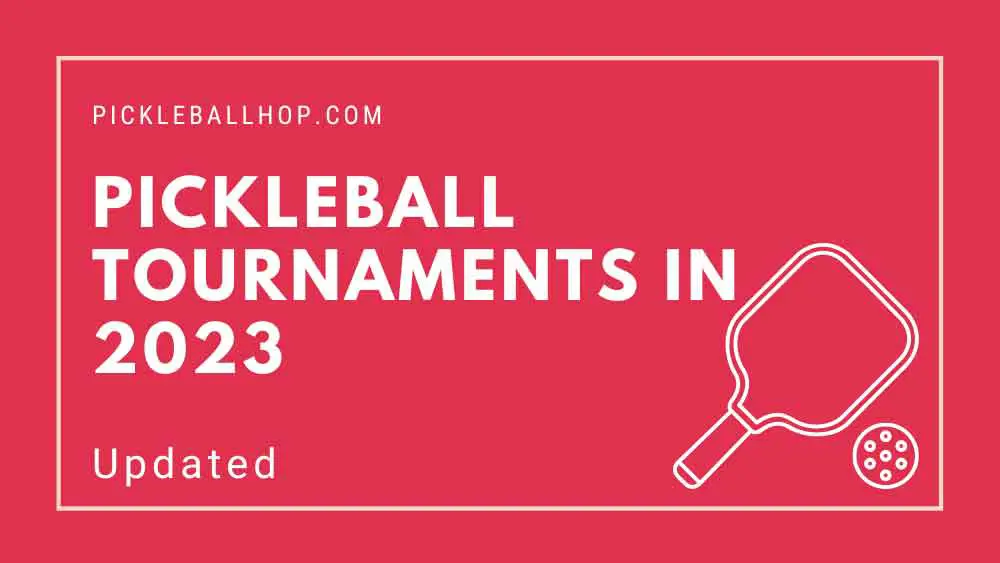From badminton to table tennis, pickleball incorporates all the best elements of other racket sports. It’s great to learn new pickleball terminology, but there is a lot to remember!
Whenever you’re just starting out, you’re probably asking yourself questions such as:
When it comes to pickleball, what does Opa stand for?
How do you refer to the ball in pickleball?
In slang, what is the non-volley zone called?
Do not be afraid to ask any of these questions if you have ever wondered. This post will cover all the pickleball slang and other pickleball terms that you need to know.
It might be a good idea to bookmark this page so that you can refer to it easily. Make sure you forward it to a friend who’s new to the sport – he or she will certainly benefit from it!
Pickleball Terms: What You Need To Know
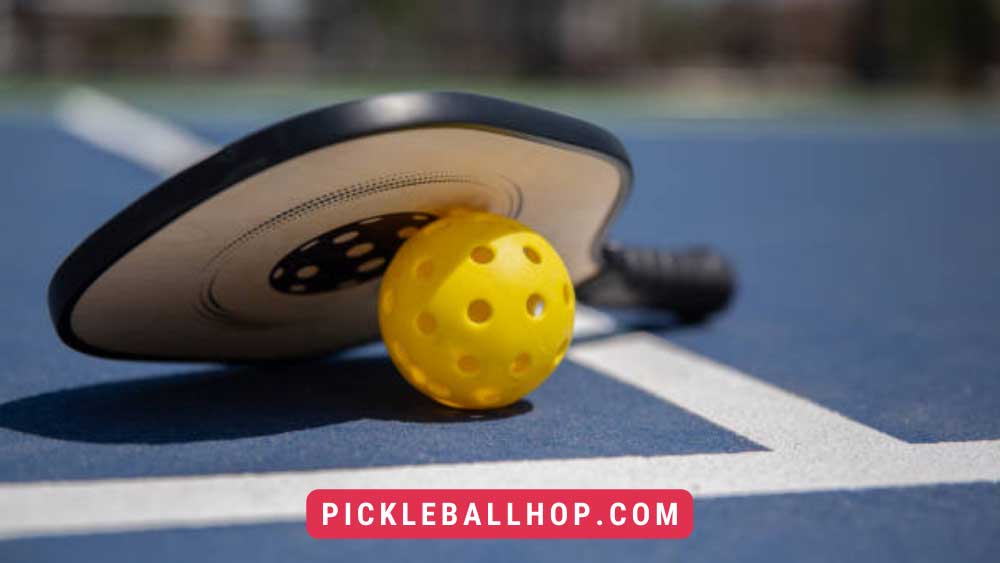 There are no complicated rules in pickleball, which makes it an easy game to learn for beginners. Pickleball terminology can initially be confusing for newcomers to the sport.
There are no complicated rules in pickleball, which makes it an easy game to learn for beginners. Pickleball terminology can initially be confusing for newcomers to the sport.
This will be the most challenging part of starting out with this game, so don’t worry!
Due to the constant addition of new pickleball terms, even people with the highest skill level can have difficulty understanding this.
The pickleball slang guide will help you regardless of how much pickleball knowledge you have.
You’ll find it quite funny learning some pickleball terms and sayings after you get the hang of it!
In order to help you hit the court with confidence, we have listed the most important terms and their definitions.
In no time, you will become fluent in the language of pickleball, from equipment to shots and any pickleball slang you may hear.
Pickleball Terminology Explained: An easy guide
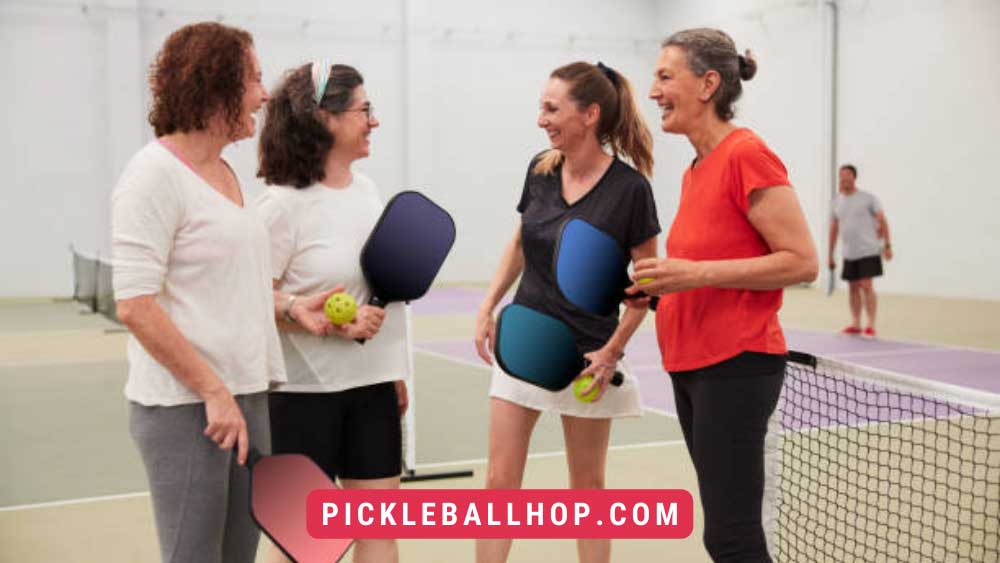 Getting started with Pickleball requires four basic items: a Pickleball ball, a Pickleball paddle, a Pickleball net, and a grasp of the rules and language used on the court.
Getting started with Pickleball requires four basic items: a Pickleball ball, a Pickleball paddle, a Pickleball net, and a grasp of the rules and language used on the court.
Having trouble remembering everything is okay. Taking up pickleball is easy and enjoyable, which is why it’s so popular.
There will always be someone nearby if you get lost with up to four people packed into a small court.
Getting started in pickleball requires a basic understanding of pickleball terminology.
Ball: In pickleball, one uses a wiffle ball or a plastic ball with holes.
Paddle: Pickleball paddles aren’t rackets, they’re paddles for hitting the ball. you can also learn our guide about padel rackets here.
Doubles: Pickleball doubles involve four people divided into two teams, with each team comprising two players.
Singles: The game of pickleball singles is played by two players, one on each side without any second servers.
Skinny singles: In this game, two people play one side by themselves by using only half the court.
A Few Other Pickleball Terms
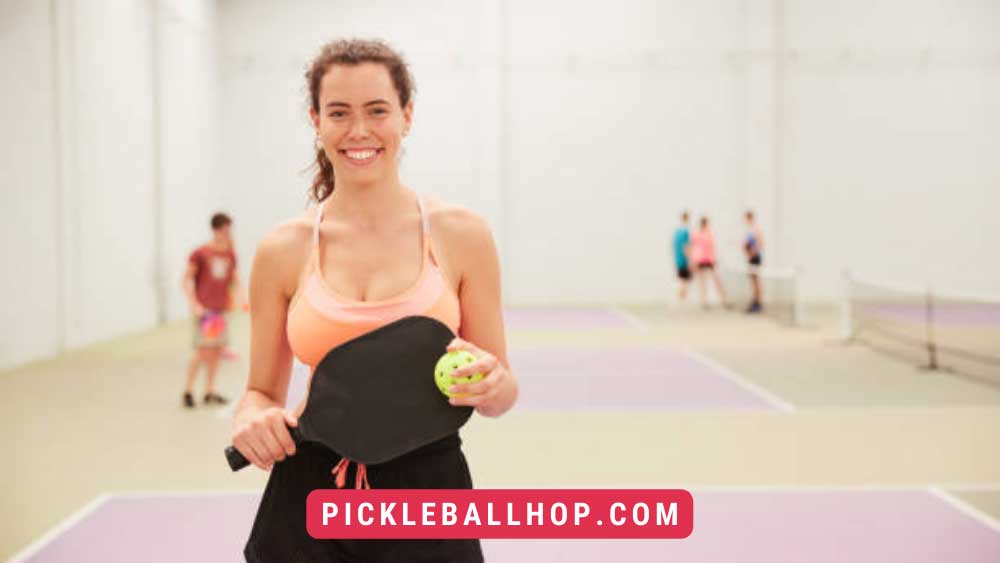 The pickleball terms you will encounter will typically refer to one or more of three things: the court, the game, or the gear.
The pickleball terms you will encounter will typically refer to one or more of three things: the court, the game, or the gear.
Court-related pickleball terms
Pickleball terminology related to courts:
Non-volley Zone: Located on either side of the net at the front, this seven-foot area is not used for volleyball. This area prohibits pickleball players from hitting balls with volleys out of the air. You can also read a guide about how much money pickleball players make by clicking here.
Non-Volley Line: An imaginary line parallel to the net indicating areas that are off limits to volley play.
Backcourt: The few feet that surround a baseline near the rear of a courtside.
Double Bounce Rule or Two Bounce Rule: After letting the ball bounce, both teams must take their first shot. Before playing the return of the serve, the receiving and serving teams must let it bounce.
Centerline: Between the non-volley zone and the baseline, the centerline divides the service court into two halves.
Sideline: The line dividing the court into two halves.
Baseline: The edge of the court at the back. The pickleball net is usually 22 feet away from the baseline.
Permanent Object: Any item on or near the court that can interfere with gameplay, such as spectators and ceilings.
Rally: A continuous game of serve and faults or points from the moment the ball is served.
Pickleball Scoring Terms & Pickleball Serving Terms
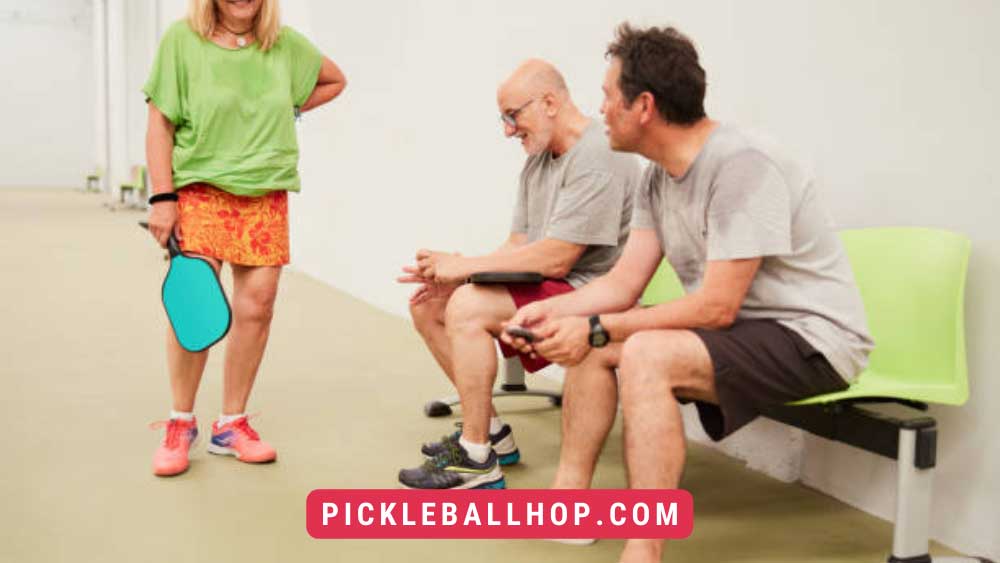 When you play pickleball, you’ll see a lot of terminologies related to the game’s two most important parts: serving and scoring.
When you play pickleball, you’ll see a lot of terminologies related to the game’s two most important parts: serving and scoring.
Pickleball terms are always used when playing, so you will hear them often.
Serve: An underhanded shot used to start a pickleball rally. Pickleball has two serves per game. In order to serve the ball, the player must be below the waist level. You can read a guide about how you can serve in pickleball by clicking here.
Service outside scoring: You can only score a point by serving in pickleball, and you must get the serve to win the point.
Server number: When playing doubles, the server is supposed to call “1” or “2”, depending on whether you are serving first or second. Along with the score, you must call this number.
Volley shot: When this shot is hit, the ball is picked up before it bounces. The player cannot make this move when he or she is in the kitchen (see below) or before he or she has fired the first three shots.
Ace: The opposing team does not return a serve
Put away: When an opponent cannot return the ball, the shot is won.
Overhead shot: Similar to a tennis serve, this is a shot that is hit over the shoulder.
Line Call: Making the call for the ball to be in or out.
Foot Fault: An incorrect foot placement results in an illegal serve or volley.
Pickleball Terminology & Other Moves
Have trouble remembering all of these? That’s okay. Playing and improving your pickleball strategy will be much easier with these tips!
Paddle Face: The paddle’s surface on which shots are made.
Approach shot: A ball that is hit as the player moves towards the pickleball net is called an approach shot.
Backhand: Preparing to shoot by moving the paddle back.
Backspin: Making the ball spin in the opposite direction by hitting it with a low-high motion.
Carry: When the paddle slides instead of rebounding off it during a forward swing, the shot is known as a carry shot.
Double hit: During one continuous groundstroke, the ball is struck twice.
Forehand: Shots made with a player’s dominant hand; for example, a left-handed player would hit the ball with their left hand.
Half Volley: When a ball bounces but does not reach full height before hitting the ground.
Punch: Use a paddle to stab the ball out of the air with a quick shot with the minimal backswing.
Top Spin: When the ball swings from low to high, it creates spin. A pickleball paddle made specifically for a spin is bought by some players.
Cross-court dink: Usually lands in the kitchen of the opposite opponent after traveling all the way from one side of the court to the other.
Lob: A shot flown extremely high and over your opponents’ heads. Your objective with this shot is to make your opponent lose the position in pursuit of the ball.
Slammers: Fast and hard balls are hit by slammers. They claim that playing like this shows poor technique since they can exhaust themselves quickly.
Dink Shot or Drop shot: An indirect shot that lands on the side of the net away from the volley.
Poach: When one team member takes a shot intended for their partner rather than letting them play, it is called poaching. In situations where one player has a much higher skill level than the other, poaching may occur.
Pickleball Sayings
Despite being a sport that fosters social interaction, pickleball has developed its own vocabulary.
While learning the language can seem like learning a new language at times, it is well worth the effort.
Your partners will be able to communicate easily (and you will always know what is happening!).
Your pickleball partners (or an opponent!) may tell you some of these pickleball sayings.
Bounce it: When the ball is likely to land out of bounds, your partner will call this out for you to do so.
OPA!: Upon hitting the third shot and beginning open rallying, a cheer is shouted out.
Nice setup: It’s another compliment. Setups in pickleball involve a player manipulating an opponent into moving to an exposed area of the court, which is not covered by the opponent.
Nice get: Is a term used to describe when your ball wasn’t easily reached or returned by someone on the court.
Nice rally: Everyone has been hitting shots for a long time, meaning there has been a good play from both teams.
Dead ball: The ball has come out of play and the point has ended.
Pickleball Slang and Funny Pickleball Sayings
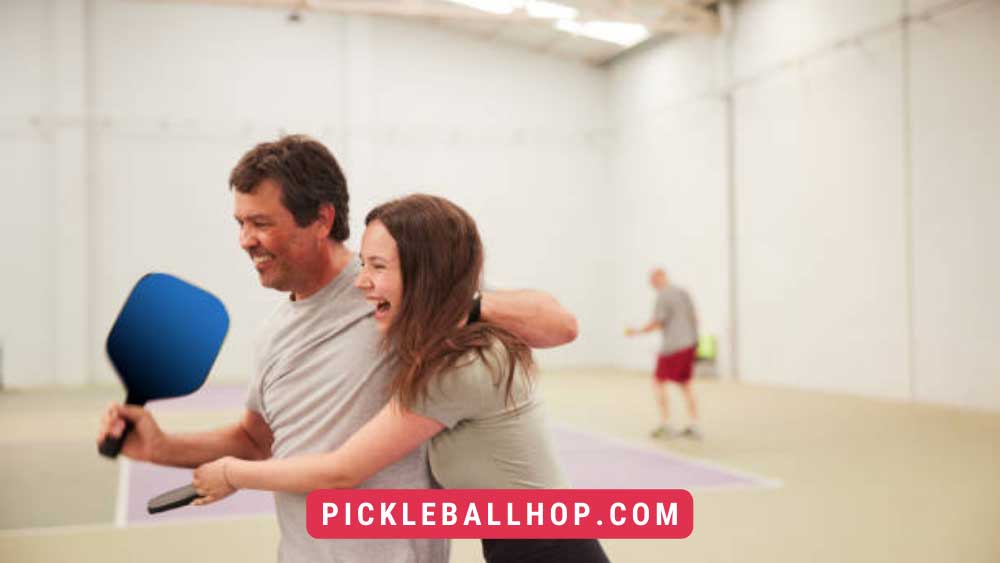 A lot of pickleball terms are unusual, which is probably something you noticed right away!
A lot of pickleball terms are unusual, which is probably something you noticed right away!
Pickleball slang has become popular among players over the years, but some of these are simply official terms.
On the court, you can hear a lot of pickleball slang and funny pickleball sayings.
Falafel: Not the food you eat in the middle east! Pickleball falafels occur when a player hits the ball without any power, so the shot does not reach its full potential.
Flapjack: An unhittable shot that must be bounced once before hitting the net.
Kitchen: The non-volleyball zone is referred to by this slang term.
Pickle!: A player shouts “Pickle!” as he or she prepares to serve the other players.
Pickled: A team has been pickled if they do not score at the end of the game. Keeping your distance from this is what you should do.
Pickledome: The court where pickleball tournaments conclude with championship matches.
Pickler: A Pickleball enthusiast who cannot stop discussing the game. Do you love pickleball?
Volley llama: A shot that is illegally hit into the kitchen by a player.
New Pickleball Terms
Several new pickleball terms are introduced every year as if there weren’t enough to keep track of already.
A pickleball saying is usually one that has gained popularity on a court, but wasn’t officially recognized before.
Our pickleball terminology section will be updated each year, so you won’t need to worry about getting lost in the jargon when you return in 2023!
New pickleball terms for 2022
In 2022, pickleball rules were amended in several ways.
There have been a number of changes to pickleball terms in recent years, including:
Technical Warning: An official’s warning for behavior that violates the rules. There is no deduction of points.
Verbal Warning: A warning given by the referee. Each team is only allowed to receive one per match.
Volley Serve: Traditionally, this method involves the server striking the pickleball ball before it bounces before releasing it.
New pickleball terms for 2021
It’s possible that you are not familiar with some pickleball terms even though you play pickleball regularly, participate in tournaments regularly, and are an active member of our Facebook community.
In January 2021, a number of new pickleball terms were added as part of the updated pickleball rules.
The following pickleball terms are being recognized for the first time in 2021:
Ejection: If a player’s unacceptable behavior prevents them from participating in a tournament, the tournament director will eject them.
Momentum: After striking the ball, a player continues in motion while still in motion, for example after executing a volley.
Plane of the net: All sides of the imaginary vertical plane that surrounds the net system.
Retirement: You would not want to retire during a pickleball match even if it is your game of choice for retirement. By doing so, you are ending the match and awarding your opponent the point.
Profanity: When addressing children or in polite company, impolite words, phrases, and gestures should be avoided. Pickleball etiquette prohibits the use of profanity!
Third Shot: After the receivers have returned the ball once, the serving team returns it. Similarly, this is the third shot of the game for the serving team after serving.

